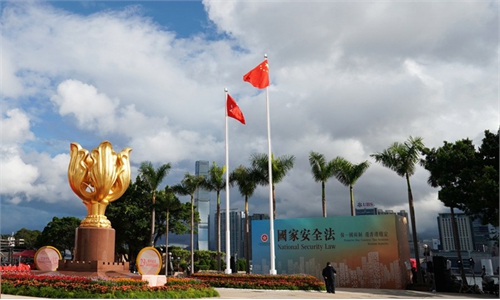COMMENTS / EXPERT ASSESSMENT
Hong Kong equity market to mend US-inflicted financing gap

Illustration: Xia Qing/GT
In a closely-watched statement late Friday, China's securities regulator vowed to take a staunch stance on institutional opening-up of capital markets, calling for the creation of conditions to forge an auditing supervision partnership with the US, while deepening connectivity between the Chinese mainland and Hong Kong and supporting stable development of the Hong Kong capital market.
The remarks almost instantly shined a spotlight on the potential of the Hong Kong capital market amid the US' push for financial decoupling with the Chinese mainland.
A strong Hong Kong capital market, on its way to increasingly appeal to international investors and cement the special administrative region (SAR)'s role as a global financial hub, would be a powerful remedy to fix the financing gap in the wake of the US' continued hostility toward Chinese listings.
The robustness of the Hong Kong market, as such, will arguably give the regulatory authorities more leeway to manage the impact on the domestic market of the US' closing the door on Chinese stock listings, while efforts remain on China's part to push for bilateral cooperation on auditing supervision.
In a sign that the US is doubling down on its crackdown on Chinese IPOs, a Bloomberg report said that the US Securities and Exchange Commission (SEC) were asking more detailed questions about firms' offshore corporate structures. The SEC in late July set new curbs on Chinese IPO hopefuls over risk disclosure.
In so doing, the US is apparently upping the ante in its clampdown targeting Chinese listings that are already being intimidated by a proposed mandate to share their audit working papers or having their US shares delisted.
China, for its part, is standing firm in pressing ahead with moves to resolve differences over audit rules. Such an attitude seems to have been amplified, with a document on financial audit regulation unveiled Monday by the State Council urging efforts to launch cross-border accounting and auditing supervision cooperation in accordance with laws and rules, thereby safeguarding national economic information securities and companies' legitimate rights and interests.
That said, the rising strength of the Hong Kong market, buoyed by its ever closer ties to the mainland, is turning the global financial hub into a compelling candidate to mend the funding gap left by the US' self-inflicted decline in global fundraising.
Instead of being overwhelmed by concerns that the US will shut the door on all Chinese listings, Chinese businessmen who have capitalized on the meteoric rise of the Chinese economy are able to leverage Hong Kong as a springboard for a new era of global business.
Already, an array of major mainland-based firms such as Alibaba, NetEase and JD.com have landed on the Hong Kong bourse, whose secondary listings come across more attention-grabbing than their US shares.
Continued progress has been made with Hong Kong's tie-up with the mainland market. Approximately 60 percent of international investors' bond investment in the mainland were done through the bond connect, while roughly two-thirds of stock investment were enabled through the stock linkups between the Hong Kong and mainland bourses, the Xinhua News Agency said in an article on Sunday, citing an exclusive interview with Eddie Yue, Chief Executive of Hong Kong Monetary Authority.
Moreover, in a most recent move to boost the attractiveness of the Hong Kong market, the Hong Kong Exchanges and Clearing, the operator of the Hong Kong bourse, announced Friday to launch an index futures contract based on the MSCI China A 50 Connect Index, which is due to commence trading on October 18.
The imminent availability of the index futures contract that is set to take on the much-watched A50 futures contract on Singapore Exchange would surely make the Hong Kong market an even stronger regional hub.
With the risk-hedging addition to the Hong Kong bourses' product portfolio, not just mainland businesses, but also companies hailing from neighboring economies and various industrial funds will likely consider a greater participation in the market, making it a more than viable alternative to US markets.
The article was compiled based on an interview with Dong Shaopeng, a senior research fellow at the Chongyang Institute for Financial Studies at Renmin University of China. bizopinion@globaltimes.com.cn



